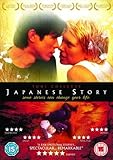Eye For Film >> Movies >> Japanese Story (2003) Film Review
Ever since Muriel's Wedding, Toni Collette has been a collectable item. She doesn't give lazy performances. Even playing support roles in Hollywood rom-coms, she's head and shoulders above the rest and one thing you remember when discussing About A Boy, after making the obvious comment that Hugh Grant isn't Four Weddings Redux for once, is Collette's neurotic mother.
Here she plays Sandy, a geologist, who the partner of a beardy bloke in a small company flogging software. She is too young to be menopausal, but is seriously pissed off and you don't know why. There are scenes with her mum that are painful because she can be so cold and dismissive. Whatever is happening in her life hasn't made the starting grid. She's cynical, lonely, bored and angry. Not the best combination for social interaction.

She finds herself having to drive miles into the red desert regions of Australia, with a formal, black-suited Japanese businessman, who can barely speak English, and she doesn't know what on earth is going on. "Why's he here?" she asks in the office."Stuffed if I know," comes the reply. It's typically Aussie, up front, in your face and casually opportunist. The man is called Mr Hiromitsu (Gotaro Tsunashima) and he might have walked off the moon as far as she is concerned.
Essentially a road movie, it takes you to places in the raw heart of the mining districts where beauty has a bleak edge and people die in the outback "all the time" (according to Sandy). Hiromitsu marvels at the hugeness of it all and tries to explain to her what it feels like to come from a small, crowded island and see this. He thinks she is his driver and calls up one of his friends on a satellite phone and discusses her in Japanese. "Very loud and aggressive," he says, grinning. "She's got as big bum." You think you can hear the friend laughing a thousand miles away.
Through a series of mishaps and adventures, a relationship of sorts begins to evolve. This is achieved with the utmost sensitivity and it is not surprising that both the writer (Alison Tilson) and director (Sue Brooks) are women. The journey is important. It represents the movement of emotion, an escape and a discovery, as real as dreams in this grand isolation/illusion, this Australian hinterland.
The writing is witty and observant, without being cruel. The direction is fluid and beautifully phrased. There is never a moment when you think, "I've been here before and I know what's going to happen," because you may have and it doesn't. The story is rich with surprises, which never feels exploitative.
Collette may well be a force of nature, with a mouth the size of summer and eyes that fill the sky. Her performance shines like gold.
Reviewed on: 05 Jun 2004




















